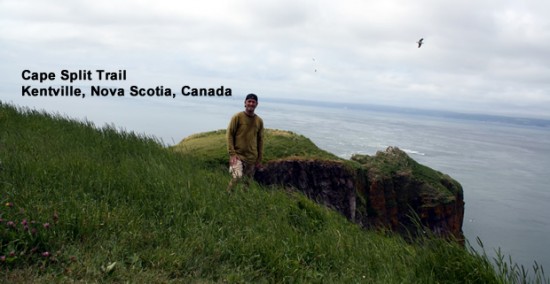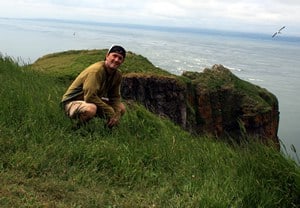From Parrsboro, Nova Scotia, Canada we moved our base camp to the village of Annapolis Royal located east of Digby, Nova Scotia. From here we would research east and west, starting with some back tracking 75 kilometres to the Kentville area to research the villages, parks and trails of the region.
The communities of Kentville and Wolfville located in the Bay of Fundy region of Nova Scotia, Canada are two communities which exceeded our expectations. Beautiful, colorful and vibrant streets bustling with life and activity.
The village main streets were lined with large victorian era buildings straight out of a history novel. Some were made of brick and stone – almost castle like – some were little red riding hood cottages made from fairy tale red bricks.
The side streets are glowing with street lamps, hanging flower baskets and lavish gardens. Sidewalks lined with cottage country wooden chairs decorated in reds, blues and greens. In the corners, some hidden some on display, were stone figurines and monuments telling stories of historic times gone by.
In Wolfville there was the Grand Pre Historic Site which commemorates the expulsion of the Acadians by the British. There is a church preaching the tales and tribulations of the Acadians and there were blooming gardens celebrating a historic and sometimes troubled past.
In the background of the village of Wolfville are rows on rows of dykes holding back the currents of the once devasting ebb and flow of tides. The dykes built from the Acadians to combat the Bay of Fundy which to this day still challenge the dykes of Wolfville. The dykes once provided and protected the fertile land for farming. And today they are considered protected historic sites explored and accessed for biking, sightseeing and hiking.
From the communities we took to the back roads along the coastline seeking more adventures in the region. We visited and explored Anthony Provincial Park, Burncoat Head Park, Highway 358 Lookout and the – much anticipated – Cape Split Trail.
The Cape Split Trail was the highlight for me in this region. It was an opportunity to bond with nature once again and another opportunity, in a long list of opportunities, to view the battering ram effects of Nova Scotia storms past and present.
Cape Split provides a real life experience, a throw back to the days of the explorer, often exposed to the unknown and the unpredictable forces of nature. Nature is often the best sculpture of the Canadian landscape carving and chipping away at the coastline like an artist at a pottery wheel shaping a vase.
The rugged terrian brought back memories of some of my favorite west coast adventures like the West Coast and Kheeha Bay Trails. The trail, often challenging, is a forested one-way 8 kilometre hiking trail (16 kilometre return) exploring a long peninsula before leading out to a rocky cliff and views of the Bay of Fundy, a rock pillar and a birding colony.
The trail is moist, sometimes fogged in. It is located on the the edge of cliffs, of what seems like the end of the the world. The forest cover protects the trail from sunlight. The tree trunks often exposed disguised as steps… and there are exposed boulders sharpened looking to trip up the most nimble hiker. There are mud puddles and then more mud puddles. Some require jumping on stones, tree trunks and sticks to cross. Some puddles forcing hikers to take it wide zig zagging back into the forest to avoid a mud bath.
The Cape Split Trail eventually climbs out of the forest and throws you out on top of a large grassy knoll teetering on the edge of some cliffs. The views of the cliffs, crashing ocean waves, the tides and the hundreds of birds settling in on top of a rock pillar makes for a perfect “postcard” moment.
The point exposed to harsh conditions can become windy… it is advised to prepare for wind chills and sudden spills if your plans are to stay a while.
The Cape Split Trail, in my humble opinion, is a must do sightseeing adventure when in the Kentville region. The effort is big but the views will transform you.


